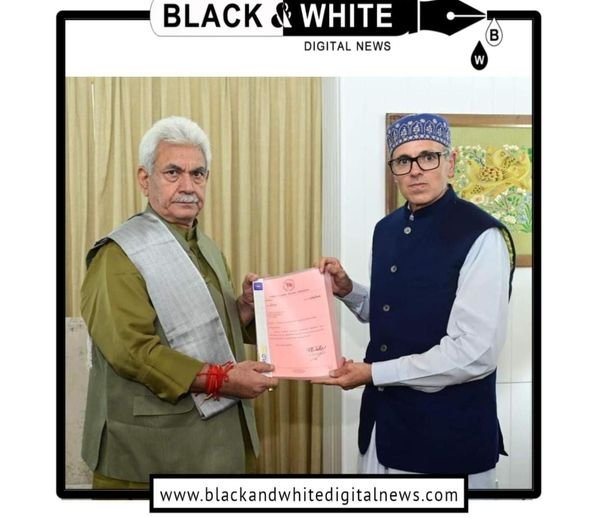Omar Abdullah Submits Letters of Support to LG Manoj Sinha, Stakes Claim to Form Government in J&K
||Black and White Digital News ||
||October 12,2024 ||
In a major political development, Omar Abdullah, Vice President of the Jammu and Kashmir National Conference (NC), has formally submitted letters of support to Lieutenant Governor Manoj Sinha, asserting his claim to form a government in Jammu and Kashmir. This move represents a crucial moment in the Union Territory’s political landscape, which has been under central rule since the abrogation of Article 370 in August 2019.
Coalition Building and Political Support:
Omar Abdullah’s claim to form the government comes after extensive discussions with various political factions. The National Conference has garnered support from the Jammu and Kashmir Pradesh Congress Committee (JKPCC), along with several independent candidates. The Communist Party of India (Marxist) (CPI(M)), led by Mohammad Yousuf Tarigami, has also thrown its weight behind Abdullah’s coalition. The People’s Democratic Party (PDP), led by Mehbooba Mufti, although not formally part of the coalition, has hinted at offering outside support, signaling the emergence of a broader anti-BJP alliance aimed at countering the party’s influence in the region.
This coalition seeks to restore democratic governance in J&K, a region that has seen extended central administration and political instability since the 2019 constitutional changes. The alliance, by uniting diverse factions, signals a new phase in Jammu and Kashmir politics, positioning itself as a proponent of regional stability and development.
Key Policy Issues:In his letter to LG Manoj Sinha, Abdullah has emphasized the urgent need to address several pressing issues in J&K. These include the restoration of statehood, economic rejuvenation, and enhanced security. Abdullah has promised to focus on youth employment, healthcare, and the revival of tourism, which has taken a significant hit due to prolonged political unrest. By proposing an agenda centered on economic growth, job creation, and peace, Abdullah aims to reset the socio-political discourse in the Union Territory.
The coalition is also expected to press for the return of democratic institutions in full capacity, stressing the importance of local representation to effectively tackle the region’s challenges, including unemployment and infrastructural deficits.
Constitutional Procedure and LG Manoj Sinha’s Role:The submission of letters of support triggers a constitutional process. LG Manoj Sinha is now tasked with verifying the validity of Abdullah’s claim, including confirming the coalition’s majority. Should he be convinced, Sinha could forward a recommendation to the central government, potentially leading to the installation of an elected government, marking a significant return to democracy in J&K.
This will be the first major political formation post the revocation of the region’s special status, testing the central government’s approach to regional autonomy and democratic restoration. The process will require careful legal and procedural consideration, especially given the complexities of the post-Article 370 era.
Political Reactions and Challenges:Omar Abdullah’s bid to form a government has drawn a mixed bag of reactions. His supporters within the National Conference, Congress, and allied parties view this as a victory for democracy and a step toward reclaiming J&K’s political identity. On the other hand, the Bharatiya Janata Party (BJP) has criticized the move, questioning the ideological coherence of the coalition and its ability to govern effectively. BJP leaders have expressed doubts about the long-term sustainability of the alliance, citing the differing political ideologies of its members.
The BJP has also raised concerns about security in the region, given the challenges posed by terrorism and ongoing militancy. The party argues that stability should not be compromised by politically expedient alliances and emphasizes the need for cohesive governance focused on national security.
Omar Abdullah’s decision to stake a claim to form the government represents a pivotal moment in Jammu and Kashmir’s post-2019 political narrative. The outcome hinges on LG Manoj Sinha’s assessment and the central government’s response, which will either lead to a democratic revival or intensify the ongoing political negotiations. As the Union Territory awaits Sinha’s decision, the implications for J&K’s future political course are immense, potentially setting the stage for renewed regional autonomy and governance.



